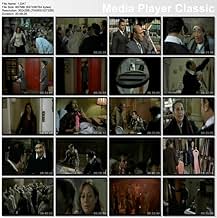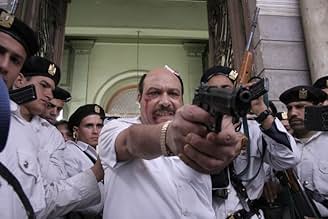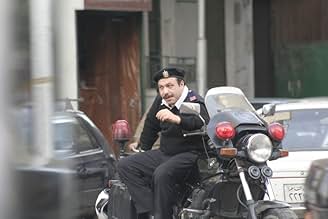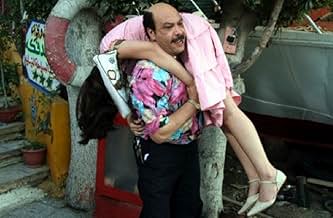Heya fawda
- 2007
- 2h 4m
ÉVALUATION IMDb
7,2/10
2,8 k
MA NOTE
Ajouter une intrigue dans votre langueEgyptian movie deals with the issue of corruption in Egypt and the Egyptian police excesses, embodies all of this in the character of the police officer, "Hatem".Egyptian movie deals with the issue of corruption in Egypt and the Egyptian police excesses, embodies all of this in the character of the police officer, "Hatem".Egyptian movie deals with the issue of corruption in Egypt and the Egyptian police excesses, embodies all of this in the character of the police officer, "Hatem".
- Directors
- Writer
- Stars
- Prix
- 2 nominations au total
Avis en vedette
With the combined power of Youssef Chahine's fearless guts, and Khaled Youssef's spectacular narrative style, "Heya Fawda" can only be perceived as a cinematic up-boost to Egyptian Cinema. Both directors reveal their touches in this socio-political story, by addressing wide-spread concerns in Egyptian society, yet through a moving drama, manipulated by a story-line that contradicts the pessimistic perception of Egyptians as passive and manipulated by the dominance of corruption and oppression.
The plot takes us through the different desires of life, starting from power and self-fulfillment, to love and its different forms ranging from the innocence of virginity, to the sadistic extreme of possession. Nonetheless, it contemplates the definition of a villain by arousing paradox feelings in regards to societal and psychological changes driven by one's background, loss, and deprivations, and the justification to those ends. The film portrays society in its turning points... From a psychoanalytical retrospect, Hatem, resembling Darwin's child who lives their entire life oppressed by the fear of castration and is driven by his lust for such needs until they erode even the purest of his sentiments, pushing him into society's greatest evils. However, the political implications of Hatem's character run beyond that to reveal the part of society that is reluctant to change; that by which the darkness of capitalism have disrupted forever and turned everything in it into "chaos". On the other hand, Nour and Cherif's characters reveal the future, or the dream of one... They both live the nightmare and are poisoned by the same water, yet they rise upon that and raise their voices higher than the pollution eating up the hopes of an improved tomorrow... Even when they're at their utmost break, they find a way to fight the havoc and see a glimpse of justice and light to the fatal incidents that dominate their lives, or in the bigger picture, society.
There is no doubt that Chahine and Youssef's merging together, brings out the best in them. "Heya Fawda" is one of the few Arabic movies that are reluctant to the melodramatic exaggerations, which turn the film into an obnoxious experience that offends the viewers' intelligence; nonetheless, the deep metaphors give a further meaning to this multi-genre movie making it almost complete. The film is rather a documentary encapsulating passion, suspense, politics, drama, and psychoanalysis in a few hours; it is simply the "Egyptian Society" uncovered.
The plot takes us through the different desires of life, starting from power and self-fulfillment, to love and its different forms ranging from the innocence of virginity, to the sadistic extreme of possession. Nonetheless, it contemplates the definition of a villain by arousing paradox feelings in regards to societal and psychological changes driven by one's background, loss, and deprivations, and the justification to those ends. The film portrays society in its turning points... From a psychoanalytical retrospect, Hatem, resembling Darwin's child who lives their entire life oppressed by the fear of castration and is driven by his lust for such needs until they erode even the purest of his sentiments, pushing him into society's greatest evils. However, the political implications of Hatem's character run beyond that to reveal the part of society that is reluctant to change; that by which the darkness of capitalism have disrupted forever and turned everything in it into "chaos". On the other hand, Nour and Cherif's characters reveal the future, or the dream of one... They both live the nightmare and are poisoned by the same water, yet they rise upon that and raise their voices higher than the pollution eating up the hopes of an improved tomorrow... Even when they're at their utmost break, they find a way to fight the havoc and see a glimpse of justice and light to the fatal incidents that dominate their lives, or in the bigger picture, society.
There is no doubt that Chahine and Youssef's merging together, brings out the best in them. "Heya Fawda" is one of the few Arabic movies that are reluctant to the melodramatic exaggerations, which turn the film into an obnoxious experience that offends the viewers' intelligence; nonetheless, the deep metaphors give a further meaning to this multi-genre movie making it almost complete. The film is rather a documentary encapsulating passion, suspense, politics, drama, and psychoanalysis in a few hours; it is simply the "Egyptian Society" uncovered.
The movie describes the political issues at Egypt which need to change and the movie imagines that they are changed and solved .
Some people at Egypt count it as the best political movie at Egypt .
Some people at Egypt count it as the best political movie at Egypt .
I saw this at the 2008 Palm Springs International Film Festival. Cannes Film Festival Lifetime Achievement Award winner and longtime Egyptian director Youseff Chahine was in ill health toward the end of the filming of this picture thus the credit for Khaled Youssef as an additional director. The story takes place in modern day Cairo in a lower to middle class part of town called Shubra. Hatem (Khaled Saleh) is a tormented, sadistic, corrupt policeman who has the run of the local police station and the neighborhood. His weakness is an unrequited love for his neighbor, the beautiful Nour (Mena Shalaby). Nour is a schoolteacher at a nearby school and has her own unrequited love going for the handsome and kind District Attorney Sheriff (Youssef El Sheriff). Sheriff is unhappily in love with the beautiful Sylvia (Dorra Zarrouk) who is a drug taking, night clubbing, living in the fast lane, westernized opposite attraction to the straight-laced Sheriff. Nour shares an apartment with her mother Bahi (Hala Fakir) but also shares a mother-daughter relationship with her headmistress, the still beautiful Wedad (Hala Sedky) who is also Sheriff's mother. Wedad and Bahi share Nour's desire that someday Sheriff will drop Sylvia and marry Nour. It's a great cast with Khaled Saleh in a great screen role as the villainous and brutal Hatem. The Screenplay by Nasser Abdel Rahman is a little implausible at times but the over-the top story, direction and music seem to work. Cinematography by Ramsis Marzouk, Editing by Ghanda Ezz El Din and Music by Yasser Abdel Rahman. This plays well to a western audience and there are some nicely woven comedic moments to the film's dark and sobering moments. I would recommend this and give it an 8.0 out of 10.
'Chaos' is a simple but motivating film which not only gives us a glimpse of life in the busy city of Cairo in Egypt but also unwraps the supposed corruption that has infected law and order. The movie shows that the law enforcers can't abuse and twist the law for their own selfish purposes forever and that the strength of the people shall always bring down those who oppress the people.
The movie has displayed some amazing talent in Khaled Saleh "Hatem". The story shows how monsters like him get created. Although, there is considerable room for improvement both in the story and the acting, overall the performances are good and honest.
Do watch this good-defeats-evil movie not just for the story but for the overall great performances and its setting in the sultry city along the Nile.
The movie has displayed some amazing talent in Khaled Saleh "Hatem". The story shows how monsters like him get created. Although, there is considerable room for improvement both in the story and the acting, overall the performances are good and honest.
Do watch this good-defeats-evil movie not just for the story but for the overall great performances and its setting in the sultry city along the Nile.
the movie is really very amazing and gave people a background about what the police can do with people behind the closed doors but the disappointing on this movie are the scenes in the police station are more than what can happen in real life ,Khaled Saleh acted his role very very good ,Mena Shalaby her role was so beautiful and she done it very good ,Hala Fakher her role was impressive but she gave a funny scenes and she was a comedian woman ,Yossef El-Sheriff was very good in his role and Hala Sedki (Sherif's Mother) acted her role very nice like a mother who can take care about her son and choose the best girl to be his wife ,but by the way the movie is very good and in fact is the weakest CHAHIN movies ever
Le saviez-vous
- AnecdotesThe movie title was originally "Chaos, it is", yet the Egyptian censorship requested an addition of "?" at the end so it'll be like a question not an affirmation. The main theme of the movie is the chaos, corruption and brutality by the Egyptian police.
- ConnexionsEdited into Les pharaons de l'Egypte moderne: Moubarak (2016)
Meilleurs choix
Connectez-vous pour évaluer et surveiller les recommandations personnalisées
- How long is Chaos, This Is?Propulsé par Alexa
Détails
- Date de sortie
- Pays d’origine
- Sites officiels
- Langue
- Aussi connu sous le nom de
- Chaos
- Lieux de tournage
- sociétés de production
- Consultez plus de crédits d'entreprise sur IMDbPro
Box-office
- Budget
- 2 000 000 $ US (estimation)
- Brut – à l'échelle mondiale
- 144 357 $ US
- Durée2 heures 4 minutes
- Couleur
- Rapport de forme
- 1.85 : 1
Contribuer à cette page
Suggérer une modification ou ajouter du contenu manquant

Lacune principale
By what name was Heya fawda (2007) officially released in India in English?
Répondre
























